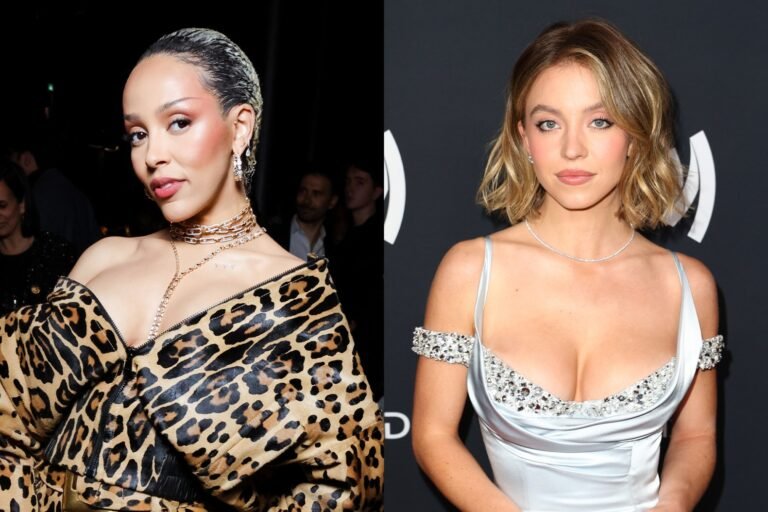Doja Cat Parodies Sydney Sweeney’s Viral American Eagle Ad in Bold New Spoof…read more…
In a move that blended satire, fashion, and cultural commentary, Doja Cat set social media ablaze this week after releasing a spoof of Sydney Sweeney’s now-infamous American Eagle campaign. Known for her bold aesthetics and no-holds-barred approach to pop culture, Doja’s parody wasn’t just entertainment—it was a direct statement about celebrity branding, consumerism, and the controversy surrounding Sweeney’s original ad.
A Spoof That Stings
The spoof, released via Instagram and TikTok, featured Doja Cat posing in exaggerated American Eagle denim looks while striking near-identical poses to Sydney Sweeney’s campaign, which debuted earlier this month to mixed reactions. In the original campaign, Sweeney, dressed in all-American denim attire, stood against scenic backgrounds that some critics called “anachronistic,” “tone-deaf,” or “hyper-patriotic.”
Doja’s version leaned into that criticism, going full throttle with denim cowboy hats, rhinestone-covered overalls, and American flags waving wildly in the background. Instead of the polished voiceover Sweeney used, Doja narrated her spoof with dry, sarcastic commentary: “Nothing says freedom like mass-produced denim stitched in a factory across the globe. Thank you, America.”
The Internet Reacts
Within hours of posting, Doja Cat’s video went viral. Fans and critics alike took to social media to dissect the parody, debating whether it was a jab at Sydney Sweeney, the brand itself, or the wider fashion industry’s occasional missteps.
“Doja Cat is a genius,” one fan wrote on X (formerly Twitter). “She turned a cringey ad into a cultural moment.”
Others saw it as a thinly veiled critique of celebrity endorsements: “This isn’t just about Sweeney. Doja is calling out the whole system of fame-for-sale. Brilliant,” another comment read.
Even some fashion insiders chimed in. Vogue contributor Emma Moreno tweeted, “The satire in Doja’s spoof highlights the disconnect between glossy campaigns and real-world context. It’s hilarious and biting.”
Background on Sweeney’s American Eagle Campaign
Sydney Sweeney’s campaign with American Eagle was meant to mark the brand’s return to its early 2000s roots: youthful freedom, patriotic motifs, and aspirational Americana. The campaign launched just weeks after the Fourth of July and featured Sweeney in open fields, small-town diners, and roadside motels—evoking nostalgia and idealism.
But public reception was sharply divided. Critics labeled it “politically oblivious” and “too nationalistic” in an election year marked by divisiveness. Others simply found it aesthetically outdated or tone-deaf to global events.
American Eagle, in response to the backlash, issued a statement that the campaign aimed to “celebrate American youth, self-expression, and inclusivity,” and that it stood behind Sweeney “as a creative collaborator.”
Doja Cat’s History of Cultural Commentary
This isn’t the first time Doja Cat has used parody and performance to make a statement. The Grammy-winning artist is well-known for blurring the lines between satire and sincerity in her music videos and public appearances.
From her early hit “Mooo!” to her recent fashion stunts—like painting herself head-to-toe in red crystals for a Paris Fashion Week appearance—Doja has shown a knack for using absurdity to critique pop culture norms.
“She understands the spectacle,” said pop culture analyst Jermaine Ford. “Doja Cat has always played the game by exaggerating it to the point of collapse. This parody fits right into that tradition.”
What Does This Mean for Celebrity Branding?
While Sweeney has not commented publicly on the spoof, sources close to the actress say she “found it surprising but not offensive.” American Eagle, on the other hand, declined to comment when asked if it viewed Doja’s parody as brand-damaging or otherwise.
In an era where celebrity endorsements are scrutinized as much for their social messaging as their aesthetic, Doja’s spoof poses a relevant question: Are these campaigns connecting with audiences, or simply pushing outdated ideals through shiny packaging?
Branding expert and professor Marla Greene commented, “Doja Cat’s spoof illustrates how out of step some legacy campaigns can be. Brands need to understand that Gen Z and younger millennials are incredibly media literate—and satire like this works because people get it.”
Fans Draw the Line
Not everyone found the spoof humorous. Some Sweeney fans argued that the parody was “unnecessary” or “mean-spirited,” especially considering the harsh criticism Sweeney has already received.
“Poking fun at another woman in the industry? Not the move,” one user posted on Instagram.
However, others pushed back, noting that satire is a valid form of critique and that Doja’s target wasn’t necessarily Sweeney herself but the industry machine behind such campaigns.
“She’s not mocking Sydney—she’s mocking the system that creates these campaigns. Let’s not confuse the two,” another fan argued.
The Bigger Picture
Whether you view Doja Cat’s spoof as a brilliant critique or an over-the-top joke, it undeniably succeeded in sparking conversation. In an entertainment landscape where celebrities are often expected to conform, Doja continues to stand out for her unpredictable and unapologetic voice.
“She’s doing what artists should do—challenge, provoke, and entertain,” said Ford. “She’s not just trolling; she’s making a point.”
As fashion and advertising continue to evolve alongside shifting political and cultural norms, moments like this remind us that not all campaigns land the way brands intend. And with artists like Doja Cat keeping watch—and poking fun—there’s little room for missteps to go unnoticed.
Final Thoughts
In parodying Sydney Sweeney’s American Eagle ad, Doja Cat may not have just started a feud—she may have reignited a debate about what celebrity marketing should actually stand for. If anything, it proves that in today’s hyper-aware media climate, authenticity and awareness are more essential than ever.
Whether or not other stars will follow Doja’s lead remains to be seen. But for now, she’s reminded us t
hat denim, drama, and dry humor can still make for a powerful mix.



